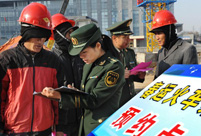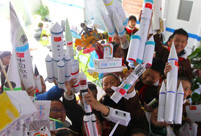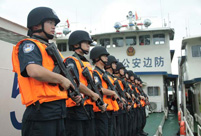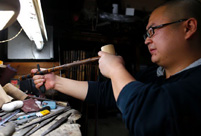SHENZHEN, Dec. 23 -- Seven children have now died in China since November following hepatitis B vaccination, raising questions of the effectiveness of the emergency response.
To date, four infants have died in south China's Guangdong Province after hepatitis B vaccinations with products made by Biokangtai,a Shenzhen drug manufacturer, the Provincial Disease Control and Prevention Center said on Monday.
The four deaths in Guangdong occurred in Zhongshan, Jiangmen, Shenzhen and Meizhou, but the Zhongshan case was not related to the vaccine. The baby in that case died of pneumonia, according to the center.
Autopsy results have not yet been released for the other three cases. Cause of the death can only be confirmed after autopsies which normally take 30 working days.
Two babies in neighboring Hunan Province and another in the southwestern province of Sichuan died in similar circumstances, according to the National Health and Family Planning Commission.
A circular on Friday ordered suspension of Biokangtai vaccinations,two weeks after the first Biokangtai link was established on Dec. 6. Babies died in Hunan on Dec. 9 and in Shenzhen on Dec. 17.
A newborn in Hanshou County of Hunan showed a severe adverse reaction after being vaccinated on Nov. 25, according to local disease control authorities.
In response to the criticism, Biokangtai released a statement on Dec. 16 saying that "coincidental events are commonplace and easy to misinterpret," which did very little to deflate public anger and panic.
It is still not clear how many problematic vaccines were dispatched and used in other parts of China. Biokangtai is a major supplier of free hepatitis B vaccine, accounting for about 60 percent of the market share.
Many questions are being asked. Should the government have suspended use of Biokangtai vaccines earlier? Could the latest death in Shenzhen have been prevented?
The China Food and Drug Administration sent out a circular on Dec. 13, asking local authorities to stop using two batches of Biokangtai hepatitis B vaccine: C201207088 and C201207090. By that time, the problematic vaccines were already in use in Guangdong, Hunan and Guizhou provinces.
Four days later, a baby died in Shenzhen 70 minutes after an injection from a different batch of Biokangtai vaccine -- C201207086.
The father of the baby told Xinhua that doctors had said the infant was in good condition before the vaccination, shortly after his birth last Tuesday morning in hospital.
According to the 2011 Chinese emergency response regulations on medical safety emergencies, relevant information should be disseminated to the public as swiftly as possible when emergencies occur.
Shenzhen reported the case to higher authorities on Dec. 19, two days after the tragedy because the health authority did not immediately associate the death the vaccine, said Zhang Shiyin of the municipal disease control and prevention center.
"We only associated the death with the vaccine on Dec. 18 when the family asked for compensation," said Zhang. Shenzhen suspended use of the C201207086 vaccine on Dec. 19.
As of Monday, Guangdong had dispensed 113,964 doses of C201207086. More than 6.2 million Biokangtai hepatitis B vaccines have been used this year, according to the disease control center.
Vaccines which had not been used were sealed and the center is following up all the vaccines that have been used.
Vaccine regulations mean free hepatitis B vaccines are procured and delivered by provincial health authorities and there is now a huge shortfall in free hepatitis B vaccine since the suspension of Biokangtai products.
The Guangdong disease control center has procured 1.45 million doses of hepatitis B vaccine from another supplier, Beijing Tiantan Biological Products, which can meet demand for two or three months. The new vaccines were sent to hospitals on Monday night, according to Zhang.
Some hospitals are using non-free vaccines to fill the temporary deficiency.
"The hepatitis B vaccines we are using now are from a company from the northeastern city of Dalian and they are not free," said Yang Jinmin with Nanwan Hospital in Shenzhen.
"If the baby's father or mother is infected with hepatitis B, the baby must be injected within 24 hours. Those babies will be given priority," said Yang.
Other babies can receive the injections one or two weeks later without being in danger, he added.
 People prepare for upcoming 'Chunyun'
People prepare for upcoming 'Chunyun'  Highlights of Beijing int'l luxury show
Highlights of Beijing int'l luxury show Record of Chinese expressions in 2013
Record of Chinese expressions in 2013 China's moon rover, lander photograph each other
China's moon rover, lander photograph each other 17th joint patrol of Mekong River to start
17th joint patrol of Mekong River to start Spring City Kunming witnesses snowfall
Spring City Kunming witnesses snowfall Heritage of Jinghu, arts of strings
Heritage of Jinghu, arts of strings Weekly Sports Photos
Weekly Sports Photos PLA elite units unveiled
PLA elite units unveiled  China's stealth fighters hold drill over plateau
China's stealth fighters hold drill over plateau Chinese navy hospital ship's mission
Chinese navy hospital ship's mission  "Free lunch" program initiated in NW China
"Free lunch" program initiated in NW China  Rime scenery in Mount Huangshan
Rime scenery in Mount Huangshan DPRK's Kaesong Industrial Complex
DPRK's Kaesong Industrial Complex 'Jin' named the word of the year
'Jin' named the word of the year Day|Week|Month